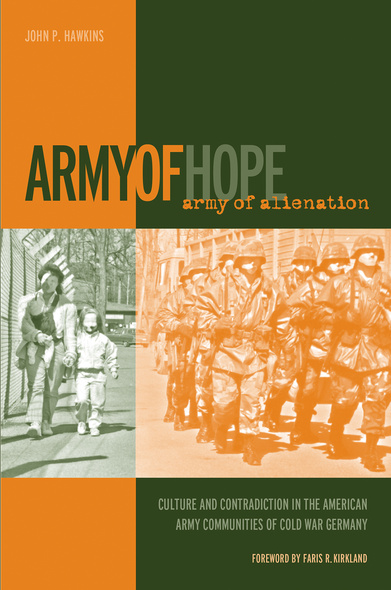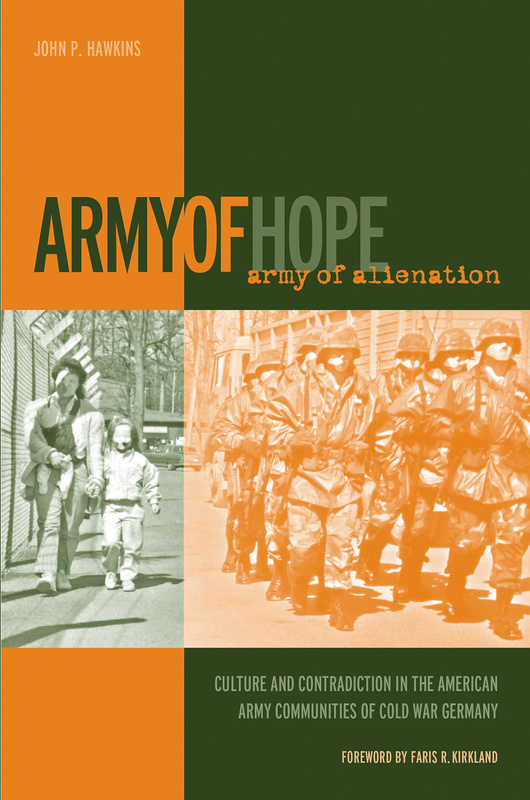Army of Hope, Army of Alienation
Culture and Contradiction in the American Army Communities of Cold War Germany
By John P. Hawkins; Foreword by Faris R. Kirkland
University of Alabama Press
Seeks to penetrate the logic, social structure, and daily practice of life in American military communities in Germany
Army life has always been known as a life of sacrifice, challenge, and frustration, yet one filled also with deep satisfactions. This is so for the soldiers’ families as much as for the soldiers themselves. Over the years, military and civilian leaders of the US Army have tried to reduce the hardships of military life by creating an array of community services designed to provide social support for soldiers and families and help them live satisfying lives in military communities.
Unfortunately, this effort has not been particularly successful, and frustration, dissatisfaction, and alienation persist among soldiers and family member in the US Army communities in Germany. Discontent continues because the underlying sources of alienation in the Army and among its families are highly complex, poorly understood, and therefore hardly addressed by the Army’s quality-of-life programs that are intended to make soldier and family life more bearable.
In Army of Hope, Army of Alienation: Culture and Contradiction in the American Army Communities of Cold War Germany, the author seeks to penetrate the logic, social structure, and daily practice of life in the American military communities that lay scattered along the frontier between East and West Germany during the final years of the Cold War. In coming to understand the life and thought of these American soldiers and families, ordinary American citizens can learn much about their military forces and about their own society and culture. In addition, a greater understanding about how people work and live around an institution that is at once so important and yet tasked with a mission so different from that of ordinary pursuits can stimulate social scientists and concerned citizens to think differently about culture, society, and behavior in general.
Army life has always been known as a life of sacrifice, challenge, and frustration, yet one filled also with deep satisfactions. This is so for the soldiers’ families as much as for the soldiers themselves. Over the years, military and civilian leaders of the US Army have tried to reduce the hardships of military life by creating an array of community services designed to provide social support for soldiers and families and help them live satisfying lives in military communities.
Unfortunately, this effort has not been particularly successful, and frustration, dissatisfaction, and alienation persist among soldiers and family member in the US Army communities in Germany. Discontent continues because the underlying sources of alienation in the Army and among its families are highly complex, poorly understood, and therefore hardly addressed by the Army’s quality-of-life programs that are intended to make soldier and family life more bearable.
In Army of Hope, Army of Alienation: Culture and Contradiction in the American Army Communities of Cold War Germany, the author seeks to penetrate the logic, social structure, and daily practice of life in the American military communities that lay scattered along the frontier between East and West Germany during the final years of the Cold War. In coming to understand the life and thought of these American soldiers and families, ordinary American citizens can learn much about their military forces and about their own society and culture. In addition, a greater understanding about how people work and live around an institution that is at once so important and yet tasked with a mission so different from that of ordinary pursuits can stimulate social scientists and concerned citizens to think differently about culture, society, and behavior in general.
An important book. . . . A rich ethnography of the internal character and dynamics of armed forces. . . . Hawkins’s main argument is that the situation in which NATO units had to be in constant readiness for an invasion of Western Europe by the armies of the Warsaw Pact, led to a very heavy stress within the American military forces on control and alacrity. [He] systematically lays out the contradictions between civilian American cultural premises (individualism, equality, freedom of choice, readiness for compromise) and the corresponding premises of the military (unity, hierarchy, obedience, readiness for violence).’
—American Ethnologist
This is a first-rate ethnography of a little known but important community: forward-deployed American soldiers, stationed in Germany at the height of the Cold War. Hawkins mixes profound structural analysis with intimate conversational portraits to paint a picture of a military community torn between the competing demands of army life and family responsibilities. . . . An excellent teaching tool. . . . I recommend it highly.’
—Charles W. Nuckolls, author of Culture: A Problem That Cannot Be Solved
Lieutenant Colonel John Hawkins’s anthropological field study of American soldiers and their families serving and living in Germany between 1986 and 1988 is remarkable in three respects. It presents for the first time the story of families facing the constant threat of imminent and proximate nuclear war while coping with the special stresses of living and raising children in a foreign country. Second, it is the only examination of the culture of the US Army in Germany by an anthropologist who also is a field grade officer in the US Army Reserve. Finally, Hawkins integrates cultural, social, and psychological data to go beyond ethnographic description to analyze the processes through which soldiers, families, and the military hierarchy interact for the good or ill of each group.’
—from the Foreword by Faris R. Kirkland
John P. Hawkins is professor of Anthropology at Brigham Young University, a Lieutenant Colonel (retired) in the United States Army Reserve, and formerly a research officer in the Department of Military Psychiatry at Walter Reed Army Hospital.






